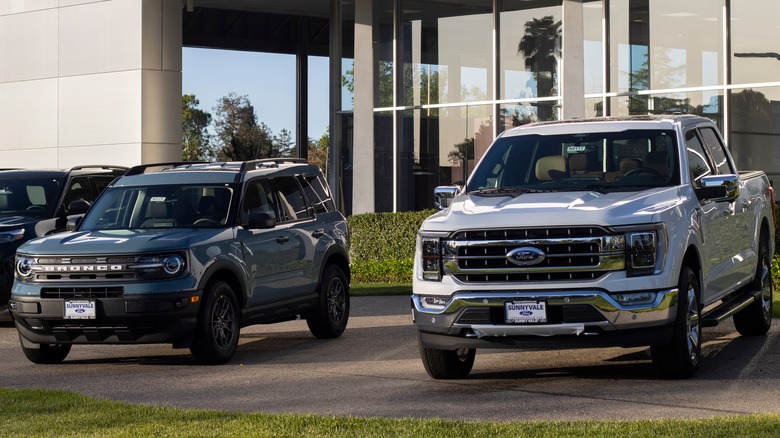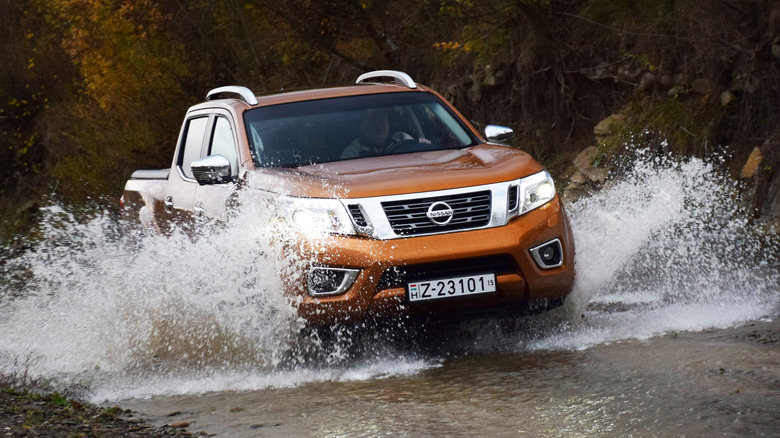Choosing Between A Truck Or SUV? Don't Forget To Consider These 5 Things
When it comes to the daunting task of selecting between a truck and an SUV, the choice can, more often than not, present a rather perplexing predicament for those in pursuit of a new mode of transportation to meet their specific needs. The wide array of attributes these options offer can appear quite complex, and the pivotal decision hinges not just on the apparent characteristics of each vehicle type but also on a better understanding of what they both represent in the automotive world.
Trucks have long been associated with a certain ruggedness and an unspoken promise of endurance. It's no secret that they have proudly stood as symbols of hard work and resilience, often favored by those who seek more than just transportation when it comes to picking out their ideal form of transport. Then, of course, there is the infamous Sport Utility Vehicle (SUV), a category that has evolved significantly over the years, embodying a harmonious blend of functionality and comfort. It's no secret that SUVs have solidified their place in the market, offering a different kind of appeal that resonates with various drivers, from families to solo adventurers.
With everything they bring to the table, there is no denying the quest to find the perfect vehicle amongst the two is not an easy endeavor for consumers. For those who can't resist the enigmatic allure of trucks and SUVs, there are several important factors to take into account before making such a substantial investment to ensure it also remains a valuable asset down the road.
Maneuverability
Maneuverability is among the many crucial aspects patrons must consider when choosing between a truck or SUV, primarily because it directly impacts how the vehicle handles in various driving situations. For trucks, which are often larger and longer, their mobility determines how easily they can navigate tight spaces, accurately respond to steering, and handle off-road terrain. This is especially important for those who plan to use their pickup for work-related tasks in construction or agriculture, where precision and ease of movement are essential. Similarly, the driveability factor in urban settings greatly affects several everyday aspects, such as its ability to park in tight spots and maneuver in traffic.
SUVs are designed for versatility and have been known to prioritize features like nimbleness and steering precision, which significantly enhance the driving experience. Ideal for families, these vehicles excel in providing safety during all kinds of unexpected scenarios on the road. SUVs also have a reputation for accurately and swiftly responding to the individual behind the wheel, especially during challenging driving conditions, such as nasty weather.
The ease with which they can negotiate turns, combined with their overall stability, contributes significantly to the comfort of everyone inside the passenger compartment, whether on an extended road trip or during everyday travel. Focusing on these qualities of agility and control is vital, as it not only meets the practical demands of driving but also ensures a secure and pleasant trip for everyone in the vehicle.
Passenger capacity
Passenger capacity is a critical element in the decision-making process for selecting a truck or SUV. Trucks are notoriously known for being traditionally designed for specific tasks and less for being a stellar option for traversing patrons around, which translates to them typically featuring limited seating. Standard models tend to mainly accommodate only two to three individuals, with some variants offering slightly more.
The lack of personnel space in the cabin most certainly makes pickups an ideal selection for potential buyers who prioritize other vehicle attributes over the ability to carry multiple travelers. The smaller arrangement fits perfectly with the needs of folks going solo on their excursions or planning to cater only to small groups when they hit the road.
Fortunately for anyone needing an alternative option to meet their purchasing requirements, SUVs take a much different approach to this matter and are distinctively recognized for being much more generous when it comes to the number of seat allocations available. They are set up to comfortably seat a larger number, ranging from five to even eight or more in some models.
This trait makes SUVs highly favorable for consumers who require ample occupancy for several riders. The ability to transport more people sets itself apart from the competition as a versatile choice for those who often travel with friends, family, or bigger groups, ensuring everyone's comfort and convenience no matter what the destination.
Cargo space
Cargo space is a significant factor when deciding whether it's a good idea to drive away with a new truck or SUV, as it gives customers looking to buy a better grasp of how useful the vehicle will be regarding different purposes. In trucks, the carrying capacity, primarily in the form of a truck bed, is essential for those who have requirements that include hauling equipment, materials, or large items.
This is particularly relevant for professionals in fields like construction and landscaping or for individuals who find themselves frequently engaging in outdoor activities such as camping or sports that require transporting a hefty amount of gear. The open bed design offers flexibility in handling oversized or irregularly shaped objects, a true difference-making feature many automobiles out there struggle to accommodate. The only downside is that because it outdoes other vehicles in this department, pickup owners may find themselves receiving a higher number of requests to help people move.
On the other hand, SUVs offer a different kind of cargo space experience that is generally enclosed and more secure, making them ideal for families and individuals who need to carry personal belongings, groceries, luggage, or sporting equipment regularly. SUVs also possess the unique ability to have their storage area expanded in several ways, thanks to the fact that they come equipped with adjustable seating configurations that can be easily modified to adapt to the driver and passenger's needs. That added flexibility is arguably invaluable for everything from daily errands to long road trips.
Gas mileage
Nobody wants to pay too much to keep their ride going, so it's pretty apparent that considering gas mileage is a pivotal part of choosing between acquiring a truck or SUV, as it significantly affects the long-term cost of owning and operating the vehicle. For trucks, which are often equipped with larger engines and are heavier, fuel efficiency can vary depending on the make and model. Those planning to use pickups for a multitude of heavy-duty tasks, such as towing or hauling, need to greatly consider the balance between the automobile's power and its petrol consumption. Not only will it have a significant impact on how much consumers spend at the pump, but it could affect the environment as well.
The importance of gas mileage in SUVs extends beyond just simply saving money. It should be viewed as a vital measurement of the vehicle's suitability for everyday life. Regular activities such as commuting to work, taking the kids to school, or weekend outings with friends all involve driving, where the amount of fuel needed becomes a key concern. An SUV with good energy conservation can significantly lower the expense of these frequent trips. In addition, modern versions have made significant advances in fuel economy, with many models on the market offering hybrid or more fuel-efficient engine options. These intriguing innovations can not only reduce the cost of regular use but also serve as a more environmentally friendly option.
Price
While everything mentioned is of vital importance, the main thing most people can agree on that makes all the difference when buying any automobile is the number on the price tag. It's no secret that cost plays a major role when choosing between a truck or SUV, as it affects how affordable the vehicle is and its overall worth. Truck prices vary a lot, depending on size, power, and extras like towing capacity and off-road abilities.
If potential buyers need a pickup for tough jobs, it might be best to consider spending more for better performance and durability. But it's also a good idea to determine which features are deemed useful for everyday requirements and to identify and avoid going outside of one's budget for attractive attributes that are nice to have but aren't very practical for a consumer's needs.
When it comes to SUVs, price has an indispensable part to play in determining the level of comfort, space, and technological advancements a buyer can expect. Higher-priced models usually offer more in terms of luxury features and cutting-edge safety systems, making them an appealing prospect for families and individuals seeking a mode of transportation that excels in convenience and reliability.
Therefore, thoroughly evaluating the price is essential to ensure everything aligns with a possible purchaser's expectations in terms of both amenities and performance. Careful consideration of how much to spend helps in selecting an SUV that meets individual preferences and represents a sound financial decision.





